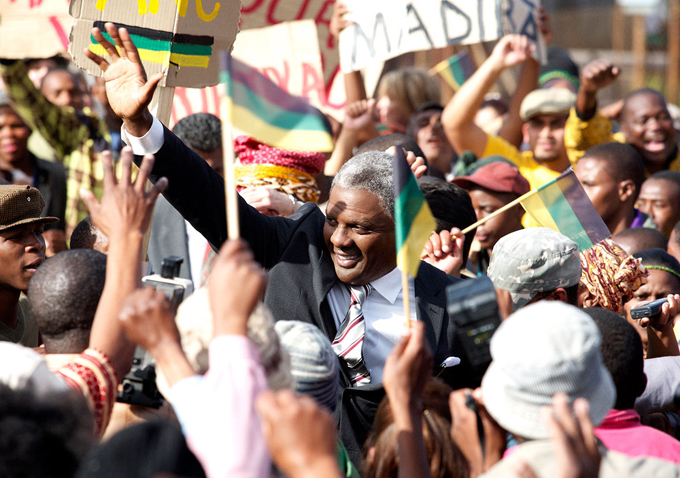 (3 / 5)
(3 / 5)
Released in the immediate aftermath of its subject’s death, Mandela: Long Walk to Freedom has the unenviable task of standing as cinematic testament to perhaps the most vital political figure in African history.
Close enough is the time you could be forgiven for thinking that the film’s publicists may have bumped off the ninety-five year-old Mandiba for the sake of a publicity coup. That were, if Long Walk wasn’t otherwise quite so respectful.
Justin Chadwick’s film sets itself apart from its biopic predecessors – such as Richard Attenborough’s 1982 Best Picture winner Gandhi – in focusing primarily on the personal issues of its protagonist, Nelson Mandela, the immediate impact of the breakup of his first marriage, his trial and imprisonment, in relation to his ongoing struggle against apartheid.
The film is even slightly rote in its rendering of tragic events – the massacre at Sharpeville, for instance, is presented in heart-rending montage; though Justin Chadwick’s direction is notable for its fluid camera movements.
Idris Elba (Pacific Rim) turns in a muscular performance as Nelson Mandela, a man forced to forsake his family for a greater cause. Mandela’s gradual transformation from strapping fresh-faced lawyer to the stooped, white-haired figure embraced by history makes up the majority of the run-time.
It’s when Long Walk examines that against that of his wife, Winnie, that the film is at its most interesting. Naomie Harris (Skyfall) embodies Winnie’s metamorphosis into righteously vengeful militarist – a Best Supporting Actress nomination seems a cert – especially in how it places at her at odds with her long-parted husband’s credo of forgiveness.
William Nicholson’s script could do with more focus, but perhaps adapting a 630 page book was always going to be an overambitious task for a single film. Likely Long Walk could have benefited from the same freedom given to director Steven Soderbergh in his two-film study of the life of Che Guevara.
Mandela is no less iconic a figure, and, if occasionally this biopic feels like an endurance of predictability, it’s maybe to be expected given what Mandela himself went through. The behavior of the Boers guards, for instance, is suitably sadistic, but we know the triumph that awaits.
Long Walk to Freedom is a worthy counterpoint to, say, the likes of Kevin Macdonald’s 2006 film Last King of Scotland and Idris Elba’s performance – if memorably less bombastic than Forrest Whittaker’s as Idi Amin – may stand, at least, as the definitive portrayal of Mandela himself. It’s a hopeful film, solidly built and lightly poetic.
Given its timing – the lack of critical distance from events, etc. – that is perhaps the most that can be asked.
